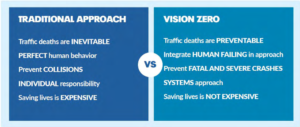Vision Zero Policy Backgrounder
Vision Zero began as a Swedish road safety initiative in 1997. It can be summarized in one sentence: No loss of life is acceptable. Human life and health are paramount values and can never be exchanged for other benefits within the society. This approach recognizes that human mistakes are inevitable so this is taken into account when designing the road transport system. To prevent deaths and serious injuries, it focuses on traffic systems, placing more responsibility for safety on system design, management and leadership. In every situation a person might fail; the road system should not.
Principles for Vision Zero include:
- Traffic deaths and injuries are preventable; therefore, none are acceptable.
- Human life and health take priority over mobility and other objectives of the road traffic system so safety is the primary consideration in transportation decision-making.
- People will make mistakes; the transportation system should be designed so those mistakes aren’t fatal.
- Providers and regulators of the road traffic system share responsibility with road users;
- Traffic safety solutions must be addressed holistically: providers, regulators and road users must all be ready to change to achieve safety.
Solutions include:
- Vehicle technology -a key part of road safety reducing deaths and injuries
- Traffic control and Surveillance – safety information and intelligent traffic systems
- Infrastructure – making mobility safe from the start involves planning, designing and building (or modifying) roads and infrastructure to increase safety and reduce fatal accidents
- Education and Training – providing safety through education and planning
When Vision Zero was first launched, Sweden recorded seven traffic fatalities per 100,000 people; by 2014, despite a significant increase in traffic volume, that number was fewer than three. This suggests that safety need not compromise mobility.
Across the globe, many countries have embraced its principles and adopted their own version of Vision Zero. In Canada, in 2015 Edmonton announced it was the first Canadian municipality to adopt a ‘Vision Zero’ strategy. In June 2016 Toronto responded to criticisms of its Road Safety Plan by setting a goal of zero deaths within five years instead of the previous 20% reduction in 10 years. At a provincial level, British Columbia, in line with the Vision Zero movement, has set a goal to have the safest roads in North America by 2020 with the ultimate goal to eliminate motor vehicle crash fatalities and serious injuries.
More Information
- Vision Zero Network
- Vision Zero Canada
- Why Sweden has so few road deaths. February 2014
- Moving to Vision Zero: Road Safety Strategy Update and Showcase of Innovation in British Columbia , 2016
- Toronto mayor vows quicker action on road safety after intense criticism, June 2016
- Vision Zero: Traffic Safety by Sweden Accessed July 2016
- The City of Edmonton: About Vision Zero


